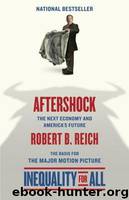Aftershock(Inequality for All--Movie Tie-In Edition) by Reich Robert B

Author:Reich, Robert B. [Reich, Robert B.]
Language: eng
Format: epub
Tags: History
ISBN: 9780345807229
Barnesnoble:
Goodreads: 9368528
Publisher: Vintage
Published: 2010-09-21T00:00:00+00:00
3
Why Can’t We Be Content with Less?
Historically, America’s cultural obsession to consume has been tempered by the “higher virtues” of thrift and self-sufficiency. “Be industrious and frugal, and you will be rich,” advised Benjamin Franklin. The simple life has been viewed as honorable. “Many of the so-called comforts of life, are not only not indispensable,” wrote Henry David Thoreau in 1854, “but positive hindrances to the elevation of mankind.” Even after the introduction of mass production and mass marketing, as Americans swooned over the tantalizing vision of the nation as cornucopia of consumer delight, many eschewed crass materialism. “The people of this country need a … philosophy of living, not having; of happiness, not wealth,” noted John Ellsworth, Jr., in The North American Review of October 1932, in the depths of the Great Depression.
Years ago, University of Illinois psychologist Ed Diener surveyed winners of state lotteries and some of the richest Americans (identified by Forbes as among the wealthiest one hundred). They expressed only slightly greater happiness than did the average American, and much of their happiness proved to be temporary. People in other countries and cultures are much the same. University of Michigan researcher Ronald Inglehart examined 256,000 people in seventeen different nations and found barely any connection between income and happiness, above a subsistence level. It turns out that what money buys has rapidly diminishing emotional returns. Once we’ve enjoyed something, the next experience of it is not quite as wonderful, and the third might even be humdrum. As long as we’re not destitute, happiness is less about getting what we want than about appreciating what we already have.
Much of what people want can’t be bought anyway. In 1943, behavioral scientist Abraham Maslow wrote “A Theory of Human Motivation,” a paper in which he posited a hierarchy of human needs. At the bottom are food, shelter, sex, and sleep (of which the first two are typically purchased, although markets also exist for the latter two). Next come safety and security (which we normally purchase as well, typically through locks on the doors and taxes that pay for police officers and a system of criminal justice). If we lack any of these basics, we’re forced to spend most of our time trying to remedy what’s missing. But once these fundamental needs are met, according to Maslow, our higher needs cannot be satisfied in the market—indeed, the very act of trying to purchase them robs them of their emotional sustenance. They include “belonging needs,” such as love, acceptance, and affiliation, and “esteem needs,” by which he meant self-respect, social status, and the approval of others. At the top of Maslow’s pyramid are “self-actualization” needs—our yearning to find meaning in our lives and to express ourselves.
By some measures, then, one could argue that with less paid work and less money to spend, people could—at least theoretically—enjoy their simpler lives. Before the Great Recession, many Americans were trying to cope with declining hourly wages by working more hours and sleeping less—by some estimates an average of one or two fewer hours each night than in the 1960s.
Download
This site does not store any files on its server. We only index and link to content provided by other sites. Please contact the content providers to delete copyright contents if any and email us, we'll remove relevant links or contents immediately.
The Secret History by Donna Tartt(19052)
The Social Justice Warrior Handbook by Lisa De Pasquale(12187)
Thirteen Reasons Why by Jay Asher(8893)
This Is How You Lose Her by Junot Diaz(6877)
Weapons of Math Destruction by Cathy O'Neil(6264)
Zero to One by Peter Thiel(5786)
Beartown by Fredrik Backman(5737)
The Myth of the Strong Leader by Archie Brown(5499)
The Fire Next Time by James Baldwin(5431)
How Democracies Die by Steven Levitsky & Daniel Ziblatt(5215)
Promise Me, Dad by Joe Biden(5141)
Stone's Rules by Roger Stone(5081)
A Higher Loyalty: Truth, Lies, and Leadership by James Comey(4954)
100 Deadly Skills by Clint Emerson(4921)
Rise and Kill First by Ronen Bergman(4779)
Secrecy World by Jake Bernstein(4741)
The David Icke Guide to the Global Conspiracy (and how to end it) by David Icke(4707)
The Farm by Tom Rob Smith(4502)
The Doomsday Machine by Daniel Ellsberg(4484)
